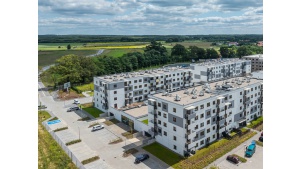Savills IM has launched a pan-Asian income and growth fund
Savills Investment Management (Savills IM), the international real estate investment manager, has launched a pan Asian income and growth fund following a first close at c. EUR 95 million which is immediately being invested.
The Savills IM Asia-Pacific Income and Growth Fund (APACIG) focuses on core-plus investments and incorporates a defined value-add component, with the potential to offer co-investment opportunities. APACIG targets an IRR in the region of 8-10%, with investments focused on Asia-Pacific’s developed markets and key gateway cities to capitalise on their stability, resilience and liquidity. The fund is available to institutional investors.
The fund targets sector diversity and will include offices, logistics/industrial, retail and residential. The target total investment volume is at approximately EUR 1 billion including a maximum debt ratio of maximum 60% at fund level.
In line with Savills IM’s Responsible Investment Policy, APACIG has sustainable characteristics and will set targets across each of the assets to reduce its environmental impact in areas including energy, water, waste, as well as enhancing social value through occupier and community engagement. It is targeting both buildings which can provide a value add opportunity for improving the sustainability credentials of these assets through retrofitting, and buildings with high sustainability characteristics.
Alongside the launch of APACIG, Savills IM has expanded its presence in the region with several senior appointments in its Sydney office. Greg Lapham has been appointed as head of investment, Australia. Greg, who will manage APACIG and lead the newly appointed four-strong investment team in Sydney, has over 30 years’ experience across real estate investment, financial reporting, corporate finance, consulting and transaction advisory. He has demonstrable local market knowledge having spent the last decade in Hong Kong, recently returning to Australia, and has invested across the breadth of the Asia-Pacific region including in Hong Kong, Japan, Malaysia, Singapore and Thailand. Greg joined Savills IM from BlackRock, where he was a managing director and chief investment officer of the AsiaPac real estate business.
Greg will be supported by investment director Guy Sainsbury, who recently joined Savills IM from Lendlease, where he held various senior development, capital raising and origination roles. The Sydney-based team has also been strengthened with the appointments of Anthony Lupis, investment manager, and Jacob van Egmond as an investment analyst. This follows recent expansion of Savills IM’s established investment team in Japan.
With the new team in place, the APACIG fund has already exchanged its first two acquisitions bringing the firm’s total AUM in Australia to c. EUR 260 million. Most recently, the fund completed the EUR 97.5 million acquisition of 241 O’Riordan Street, an 11-storey office building in the attractive submarket of Mascot, 7km from Sydney CBD and directly opposite the Sydney Domestic Airport terminal. It comprises c. 19,275 sqm lettable area, including retail offering on the ground floor. Tenants include domestic and multinationals with strong covenants, including the New South Wales Government.
As part of the acquisition process the team undertook due diligence on opportunities for upgrading the asset, including health and wellbeing, water efficiency, renewable energy and actions required to maintain the 5.5* NABERS rating for energy.
This follows the recent closing of the EUR 93.3 million acquisition of Clifford Gardens Shopping Centre, a nine-hectare site located in Toowoomba, Australia’s second largest inland city. The Centre provides convenient access to everyday goods and services with significant opportunities to improve traffic flow and further bolster its non-discretionary tenancy base.
Savills IM manages properties worth circa EUR 1.3 billion in the Asia-Pacific region with local offices in Singapore, Tokyo, Kuala Lumpur (as part of a cooperation agreement with Savills Malaysia) and Sydney.
Alex Jeffrey, CEO, Savills IM, comments:
“We have been active in the Asia-Pacific market for a number of years across a variety of different sectors. The combination of the launch of a dedicated pan-Asian strategy and the expansion of our Sydney office represents a step-change in our growth across the region.”
“The newly appointed investment team on the ground in Sydney, working in close partnership with our experienced team across Asia, is perfectly positioned to spearhead our expansion across the region. Their combined experience and expertise will be crucial in maintaining the fund’s deal pipeline and securing attractive investments that also offer co-investment opportunities.”
Greg Lapham, Head of Investment Australia, Savills IM, says:
“The Asia-Pacific real estate market offers investors strong economic growth across diverse set of investment opportunities. Due to its transparency, Australia is an important and attractive destination for real estate investments. It will play a prominent role in our continued expansion in the Asia-Pacific region. It’s likely that the next deal will be in Japan where we have a strong investment presence and where we believe growth prospects in certain sectors are also very positive.”

Deweloperzy ukrywają ceny mieszkań. Z troski o klientów czy swoje portfele?

Więcej przestrzeni, mniej hałasu – dlaczego Polacy coraz częściej wybierają przedmieścia?

Jak czytać rzuty mieszkań i uniknąć przykrych niespodzianek? AI ułatwia wybór
Więcej ważnych informacji
 Jedynka Newserii
Jedynka Newserii

 Jedynka Newserii
Jedynka Newserii

Bankowość

Rośnie liczba i wartość udzielonych konsumentom kredytów gotówkowych. Gorzej mają się kredyty ratalne oraz te udzielane firmom
Rynek kredytowy w Polsce co do zasady rośnie, choć nierównomiernie. Z danych Biura Informacji Kredytowej wynika, że najlepiej rozwija się segment kredytów gotówkowych dla konsumentów. Wartościowo wzrosła też kwota udzielonych limitów w kartach kredytowych. Według prognoz BIK w całym roku wzrośnie wartość zarówno udzielonych kredytów mieszkaniowych, jak i gotówkowych, choć tych pierwszych poniżej inflacji. Wcześniejsze cięcia stóp procentowych przez RPP nie zmieniły tej prognozy.
Transport
37,5 proc. środków z Planu Społeczno-Klimatycznego trafi na walkę z ubóstwem transportowym. Organizacje branżowe apelują o zmianę priorytetowych projektów [DEPESZA]

Ministerstwo Funduszy i Polityki Regionalnej z końcem czerwca zakończyło konsultacje Planu Społeczno-Klimatycznego, który otwiera drogę do pozyskania 65 mld zł (11,4 mld euro) z unijnego Społecznego Funduszu Klimatycznego. Polska będzie jego największym beneficjentem, a 37,5 proc. budżetu zostanie przeznaczone na bezpośrednie wsparcie osób narażonych na ubóstwo transportowe. Organizacje branżowe oceniają jednak, że walka z tym zjawiskiem może się okazać nieskuteczna. W toku konsultacji zgłosiły swoje zastrzeżenia co do priorytetów w wydatkach i sposobu wsparcia inwestycji w transport rowerowy.
Prawo
Firmy będą mogły przetestować krótszy tydzień pracy z rządowym wsparciem. Nabór wniosków ruszy w sierpniu

Ministerstwo Rodziny, Pracy i Polityki Społecznej uruchamia pilotaż krótszego tygodnia pracy. Zainteresowane wzięciem w nim udziału firmy będą się mogły ubiegać o wsparcie finansowe ze strony rządu. Politycy Nowej Lewicy, którzy są pomysłodawcami testu tego rozwiązania, przekonują, że finalnie zyskają na nim wszyscy, zarówno pracownicy, jak i pracodawcy, a ostrzeżenia o spodziewanych problemach gospodarki są mocno przesadzone.
Partner serwisu
Szkolenia

Akademia Newserii
Akademia Newserii to projekt, w ramach którego najlepsi polscy dziennikarze biznesowi, giełdowi oraz lifestylowi, a także szkoleniowcy z wieloletnim doświadczeniem dzielą się swoją wiedzą nt. pracy z mediami.

![37,5 proc. środków z Planu Społeczno-Klimatycznego trafi na walkę z ubóstwem transportowym. Organizacje branżowe apelują o zmianę priorytetowych projektów [DEPESZA]](https://www.newseria.pl/files/1097841585/rower3,w_85,_small.jpg)







.gif)

 |
| |
| |
|